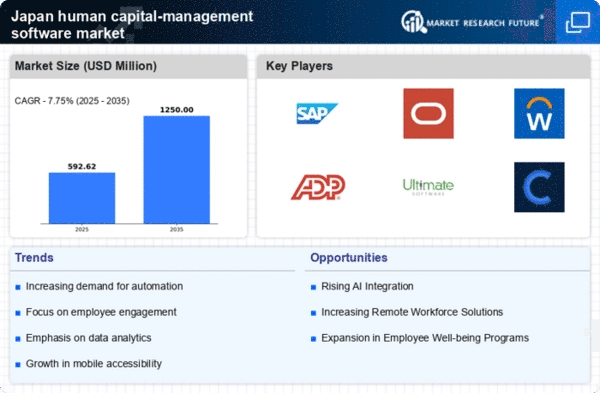Shift Towards Remote Work Solutions
The human capital-management-software market is witnessing a shift towards solutions that support remote work. As more companies in Japan adopt flexible work arrangements, there is a growing need for software that facilitates remote employee management, performance tracking, and collaboration. This shift is expected to drive market growth, with estimates suggesting that the remote work software segment could account for over 30% of the total market by 2025. Consequently, organizations are increasingly investing in human capital-management-software that can seamlessly integrate remote work functionalities, thereby enhancing productivity and employee engagement.
Integration of Cloud-Based Solutions
The human capital-management-software market is experiencing a significant shift towards cloud-based solutions. Organizations in Japan are increasingly adopting cloud technology to enhance accessibility, scalability, and cost-effectiveness. This transition is expected to drive market growth, with cloud-based human capital-management-software projected to account for over 50% of the total market share by 2025. The flexibility offered by cloud solutions allows companies to streamline HR processes and improve collaboration among teams. As such, the human capital-management-software market is likely to see continued expansion as more organizations embrace cloud technology.
Rising Demand for Workforce Analytics
The human capital-management-software market in Japan is experiencing a notable increase in demand for workforce analytics. Organizations are increasingly recognizing the value of data-driven decision-making in managing human resources. This trend is reflected in the growing investment in analytics tools, which are projected to reach approximately $1.5 billion by 2026. Companies are leveraging these insights to enhance employee performance, optimize talent acquisition, and improve retention rates. As a result, the human capital-management-software market is likely to expand, driven by the need for organizations to harness data for strategic workforce planning.
Regulatory Compliance and Labor Law Adaptation
The human capital-management-software market in Japan is increasingly influenced by the need for regulatory compliance and adaptation to evolving labor laws. Organizations are required to navigate complex regulations, which necessitates the implementation of software solutions that ensure compliance with local labor standards. This demand is expected to drive market growth, as companies seek to mitigate risks associated with non-compliance. The market for compliance-focused human capital-management-software is projected to grow by approximately 20% over the next few years, indicating a strong trend towards integrating compliance features into HR software solutions.
Increased Focus on Employee Training and Development
In Japan, there is a heightened emphasis on employee training and development, which is significantly impacting the human capital-management-software market. Companies are recognizing that continuous learning is essential for maintaining a competitive edge. As a result, investments in learning management systems (LMS) are on the rise, with projections indicating a growth rate of around 15% annually. This trend suggests that organizations are prioritizing software solutions that offer robust training modules, thereby enhancing employee skills and overall organizational performance. The human capital-management-software market is likely to benefit from this focus on development.
















